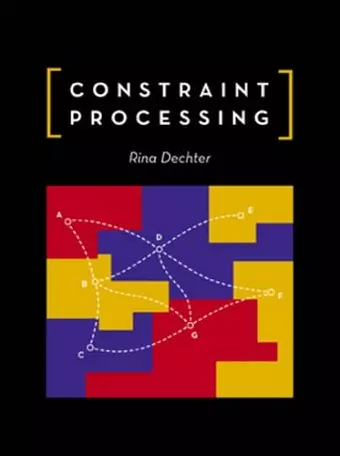Constraint Processing
Format:Hardback
Publisher:Elsevier Science & Technology
Published:22nd May '03
Should be back in stock very soon

Presents the first comprehensive examination of the theory that underlies constraint processing algorithms
Constraint satisfaction is a simple but powerful tool. Constraint problems are used to model cognitive tasks in vision, language comprehension, default reasoning, diagnosis, scheduling, temporal and spatial reasoning. This title provides an examination of the theory that underlies constraint processing algorithms.Constraint satisfaction is a simple but powerful tool. Constraints identify the impossible and reduce the realm of possibilities to effectively focus on the possible, allowing for a natural declarative formulation of what must be satisfied, without expressing how. The field of constraint reasoning has matured over the last three decades with contributions from a diverse community of researchers in artificial intelligence, databases and programming languages, operations research, management science, and applied mathematics. Today, constraint problems are used to model cognitive tasks in vision, language comprehension, default reasoning, diagnosis, scheduling, temporal and spatial reasoning. In Constraint Processing, Rina Dechter, synthesizes these contributions, along with her own significant work, to provide the first comprehensive examination of the theory that underlies constraint processing algorithms. Throughout, she focuses on fundamental tools and principles, emphasizing the representation and analysis of algorithms.
“To summarize, this book distills well over three decades worth of development in CSP and constraint processing in a single textbook. I wholeheartedly recommend it to students, researchers and practitioners in artificial intelligence, constraint programming and operations research who want to know more about the theory of constraint processing." --Roland H.C. Yap, National University of Singapore, in Theory and Practice of Logic Programming“This book provides a comprehensive and much needed introduction to the field by one of its foremost experts. It is beautifully written and presents a unifying framework capturing a wide range of techniques for processing symbolic, numerical, and probabilistic information. --Bart Selman, Cornell University“I’ve been waiting a long time for a good theoretical introduction to constraint programming. Rina Dechter’s book is just this. If you want to understand why this technology works, and how to make it work for you, then I recommend you read this book. --Toby Walsh, Cork Constraint Computation Centre“The book is rigorous but it is not difficult to read. An abundance of examples illustrate concepts and algorithms. The reader is well guided through technical issues, so intuition is never hidden by technicalities. --Pedro Meseguer, Institut d’Investigació en Intellingència Artificial – Consejo Superior de Investigaciones Científicas (IIIA-CSIC)“An indispensable resource for researchers and practitioners in AI and optimization. --Henry Kautz, University of Washington“a welcome introduction to the field of constraint satisfaction that will help researchers, educators, and students understand what constraint processing is about. It is a comprehensive book that can be used as a companion for courses on constraint satisfaction especially because the reader does not need to be an expert in the area to understand the text. The introductory character of the book makes it easy to read; nevertheless advanced students and researchers may also find deeper information on some topics there. Rina Dechter is an excellent researcher with contributions in many areas of constraint satisfaction … I strongly recommend reading this book to everyone who wants to know what is behind constraint satisfaction technology and I think that this book should definitely be in the bookshelf of everyone who teaches constraint satisfaction. --Roman Barták, Faculty of Mathematics and Physics, Charles University in Prague, Czech Republic
ISBN: 9781558608900
Dimensions: unknown
Weight: 1030g
512 pages